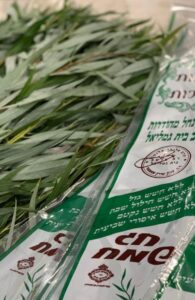TRADITION Questions: Packaging and Product

 Click here to read about this series.
Click here to read about this series.
What’s happening?
Beginning in the 1990s, pre-checked hadassim (myrtle) and aravot (willow) branches began to be sold in hermetically sealed plastic sleeves in advance of Sukkot celebrations. For generations, hadassim would lay strewn across tables (just like lulavim and etrogim) to be examined branch by branch for three leaf clusters. Meanwhile, aravot would sit in buckets of water to be checked for smooth edges and reddish stems. Inevitably, many leaves would snap from the branches as unfortunate victims to this “careful” examination. The new method of pre-checking and sealing the branches avoided such damage, as well as some natural spoilage. Additionally, the untrained customer was assured of receiving a kosher “end product,” Hekhsherim and testimonials to provenance could be attested on the clear plastic package. The new packaging streamlined the buying process for both seller and purchaser. Sealed packages for pre-checked lulavim (date palms), while attempted, have not been as popular as those for hadassim and aravot.
Why does it matter?
Sealing in plastic reflects the adoption of modern industrial packaging into religious life. It both simplifies and improves the consumer’s religious experience. However, writing in 2003, R. Chaim Jachter raised an objection to this innovation:
A disadvantage, though, is that it eliminates opportunities for parents and teachers to transmit the hands-on skills necessary for Torah observance to the next generation. It also eliminates a bit of the personal and emotional connection to the Mitzvot we observe by reducing the time that is necessary to invest to insure proper Halachic observance.
These packages outsource responsibility for kashrut (as well as a piece of the Sukkot-holiday experience) to mysterious rabbis hiding somewhere along a supply-chain. To a degree, the natural feel of religious life has been compromised, as Jewish life has adopted one more feature of the modern consumer economy. Efficiency changes an important – if possibly frustrating – feature of Jewish life.
 What questions remain? The package often defines the product and the consumer experience. Bottled water stands out as one particularly pronounced example of this. Researchers have shown that changes in packaging shape and design change consumption patterns. People buy bigger packages because they believe they are getting better value. However, this can lead to overeating, as buyers underestimate how much they consume. The packaging plays a critical role in these misperceptions. What misperceptions does the packaging of mitzvot create? What will be the effect of multiple Jewish generations who cannot salt meat or check produce for bugs? In what other areas of Jewish life has packaging changed the product?
What questions remain? The package often defines the product and the consumer experience. Bottled water stands out as one particularly pronounced example of this. Researchers have shown that changes in packaging shape and design change consumption patterns. People buy bigger packages because they believe they are getting better value. However, this can lead to overeating, as buyers underestimate how much they consume. The packaging plays a critical role in these misperceptions. What misperceptions does the packaging of mitzvot create? What will be the effect of multiple Jewish generations who cannot salt meat or check produce for bugs? In what other areas of Jewish life has packaging changed the product?
Does the move to certification reflect a growing rabbinic paternalism where more and more elements of halakhic life are no longer “do it yourself”? What are the cultural and spiritual effects of such responsibility transfer?
How does getting something in a sealed container as opposed to selecting it oneself change a person’s relationship to that object? How does the “IKEA Effect” inform mitzva observance (from baking one’s own matza to tenderly selecting an etrog)?
How does packaging impact the pricing of hadassim and aravot? How much new plastic waste is generated because of this arba minim marketing practice?
Do mass-market consumer-products affect Jewish life in other ways? Does the popularity of standard minivans influence the number of children certain families will have? Might the decline of the minivan in favor of the SUV change the size of the typical Jewish family?
The body is the package for the soul (Avot 4:20). What does a modern understanding of the consumerist package require of a tradition that demands, “Do not look at the container but rather upon that which is within?”
Chaim Strauchler, rabbi of Rinat Yisrael in Teaneck, is an Associate Editor of TRADITION.

1 Comment
Perhaps because of my advanced age, I differ. Anything that makes a religious-observant life easier is a blessing for me. There remain plenty of additional Mitzvot that are “hands-on” associated with Succot to make this added convenience nothing but a blessikng in my mind.
I’m lucky to be living in Jerusalem, where observing all opossible Mitzvot is easiest. But if I were still in the USA, I would prefer a supermaket that has one area for all Kosher products than one where label-checking is necessary for each item.
David Lloyd (ben Yaacov Yehuda) Klepper, student, Jerusalem Hesder Yeshivat Beit Orot, USA Army Veteran